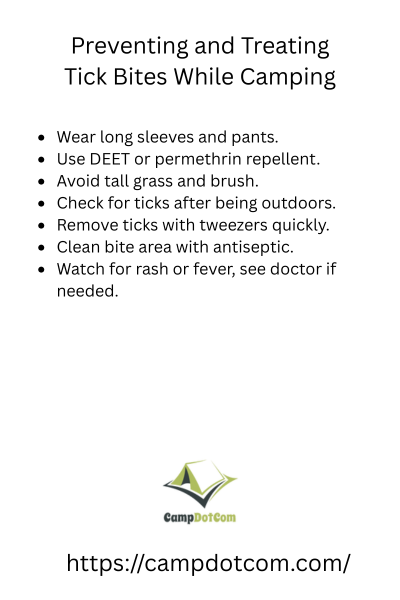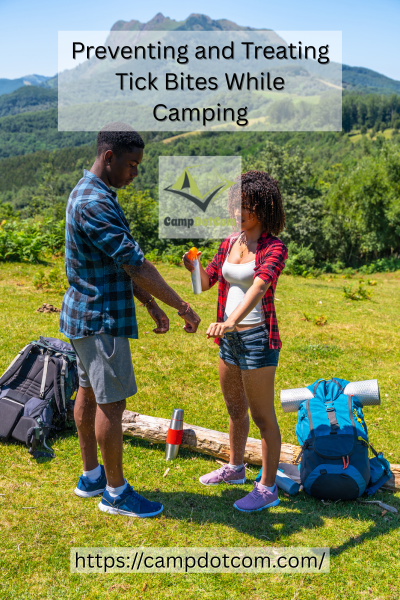If you love camping like I do, then you have probably heard the buzz about preventing and treating tick bites while camping.
Ticks are those tiny little pests that can really ruin a great outdoor trip if you are not careful. I learned this the hard way last summer, and trust me, it is worth knowing how to stay safe and what to do if you do get bitten.
Read More About Preventing and Treating Tick Bites While Camping

Why Ticks Are Such a Big Deal
You might be thinking, “It’s just a tick, how bad can it be?” Well, ticks can carry some nasty diseases like Lyme disease, which can cause serious health problems if left untreated. That’s why preventing and treating tick bites while camping isn’t just a camping pro tip, it’s a must.
As an Amazon Associate, I earn from qualifying purchases. Some of the links in this article are affiliate links. This means that, at zero cost to you, I will earn an affiliate commission if you click through the link and finalize a purchase.
When I went on a weekend hike, I thought I was well-prepared. Little did I know, a sneaky tick had hitchhiked onto my jacket. It wasn’t until a few days later that I found the little bloodsucker buried on my leg. That freaked me out and got me serious about learning how to avoid ticks in the first place.
More Things to Know About Preventing and Treating Tick Bites While Camping

How to Prevent Tick Bites While Camping
Let’s talk prevention first because it’s way easier to avoid tick bites than to deal with them later.
When you’re out in the woods or grassy areas, ticks are just waiting for you to brush past. So, here’s what you can do.
Dress smart
Long sleeves and pants create a barrier against ticks, even if they’re less comfortable in heat. Choose lightweight, breathable fabrics and light colors so ticks are easier to spot. Tucking pants into socks or boots adds extra protection.
Use tick repellents
Sprays with DEET or picaridin work well and are easy to carry. Apply to exposed skin and clothing openings like cuffs and waistbands. For longer trips, consider treating clothes with permethrin for added defense.
I recently started using Ben’s Tick and Insect Repellent instead of Off and have had great results. Although many people don’t want to slather chemicals on them, the benefits greatly outweigh the risks. It keeps all insects away.
Stick to the trails
Ticks thrive in tall grass and brush. Staying on marked paths keeps you away from their favorite hiding spots and also protects surrounding plants and wildlife.
Check yourself often
Do quick tick checks every couple of hours, especially after walking through brush. Focus on warm, hidden areas like behind knees, under arms, around the waistline, and behind ears. Use a buddy or mirror for hard-to-see spots.
What to Do If You Find a Tick
Okay, so despite your best efforts, you find a tick attached to your skin. Don’t panic. It happens, and knowing what to do next is key.
First things first: remove the tick properly. Grab a pair of fine-tipped tweezers or a tick remover kit like this one: TickCheck Premium Tick Remover Kit. Be sure to get as close to the skin as possible. Pull straight up with steady, even pressure with no twisting or jerking. This helps prevent parts of the tick’s mouth from breaking off and staying in your skin.
After removal, clean the bite area with soap and water or rubbing alcohol. Then, wash your hands thoroughly. You can save the tick in a sealed bag or container just in case you need to show it to a doctor later.
Watch for Symptoms
Here is something I did not know before. Not every tick bite leads to illness, but it is smart to watch for symptoms. If you notice a rash, especially one shaped like a bullseye, fever, chills, headaches, or muscle aches within a few weeks of the bite, get medical help right away.
I remember feeling a bit off after my tick encounter, tired and achy. Thankfully, I caught it early and the doctor gave me antibiotics. Lesson learned — never ignore how you feel after a tick bite.
Camping Smarter to Beat Ticks
One of the best things you can do is prepare your campsite smartly. Keep your tent area clear of leaf litter and tall grass. Ticks hang out in those spots, so a clean camp helps.
Also, try not to sit directly on the ground or on logs. Use a blanket or chair instead. And after your day outside, throw your clothes in a hot dryer as soon as you get back to kill any hitchhiking ticks.
Simple Steps to Prevent and Treat Tick Bites While Camping
Honestly, ticks are the worst little campers, but you do not have to let them ruin your trip. Preventing and treating tick bites while camping comes down to being prepared and staying vigilant. With some simple steps like smart clothing choices, repellents, thorough checks, and knowing how to remove ticks safely, you can enjoy the outdoors without the nasty surprises.
Next time you pack for your camping adventure, remember my tick story and keep these tips in your back pocket. Nobody wants to come home from nature only to end up at the doctor.
Got any tick horror stories or prevention tips? I would love to hear them. Let us keep each other safe out there!
